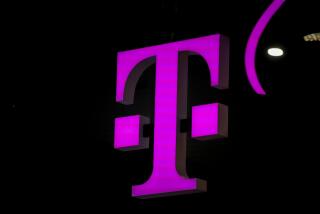Price Is Right for Takeover by Vodafone
- Share via
FRANKFURT, Germany — With Vodafone AirTouch paying a record $180 billion to acquire Germany’s Mannesmann, wireless communications have taken center stage in two of the three biggest mergers in history.
In fact, although Mannesmann squeezed nearly twice as much money from Vodafone as the British company first proposed--and 50% more than MCI WorldCom is paying for Sprint and its valuable wireless unit--analysts say the price is right for a deal that will place Vodafone at the pinnacle of a mobile communications revolution.
On Friday, the supervisory board at Mannesmann recommended that the company’s shareholders approve the deal, the product of a 2 1/2-month takeover battle that was unusually hard-fought by European standards. Under the agreement, Vodafone will exchange 58.96 shares for each Mannesmann share under the deal, up from 53.7 shares previously offered.
The merger will form a global force in wireless communications with 42 million customers worldwide. The new company will have a substantial U.S. presence through a new alliance between its AirTouch unit and Bell Atlantic’s mobile operations, but the new Vodafone’s true stronghold will be Europe, with 29 million customers and a No. 1 or No. 2 market position in 11 countries on the Continent.
Still, because Europe is the most advanced market in terms of mobile phone use, the new company may hold considerable sway in forging a global standard for the robust wireless technologies that will be deployed in the next few years.
Right now, mobile phone systems around the world are largely incompatible with one another. Europe uses GSM, a technology that plays third fiddle in the United States.
Because of the disparity, when mobile callers leave town, cross state lines or go overseas, it’s not always guaranteed they can make a call on their wireless phones. Matters are further complicated in the United States when callers roam from place to place, encountering mobile networks that use older “analog” signals or digital “PCS” technology.
But a mobile phone provider with truly global coverage would likely sport an advantage with customers, especially those who travel a lot, by providing uninterrupted service wherever they go.
Big mobile players can also expect to prosper as wireless phones meld with palmtop computers, providing services such as videoconferencing or making payments at vending machines and cash registers.
For all those reasons, the Vodafone deal is expected to trigger more telecom mergers as companies rush to grab bigger shares of the mobile market and shift away from the traditional focus on a single technology such as wireless, fixed-line or Internet service.
Vodafone Chief Executive Chris Gent said Friday in a conference call that his company already is seeking to buy other mobile phone service providers.
On the New York Stock Exchange, Vodafone’s American depositary receipts fell $3.94 to close at $57.81, while Mannesmann’s ADRs rose $3.56 to close at $325.






